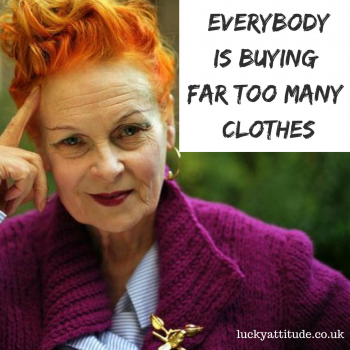The High Cost Of Cheap Clothing – Worth It?

If you’ve read my articles before, you know how strongly I feel about work-life balance, individual empowerment & fair play.
As a typical representative of my generation, I am a conscious capitalist.
I believe that a modern day business must be responsible not only for its investors, customers and employees, but also suppliers, communities and environment.
From seeking out rewarding careers to making good financial decisions, Millennials are the first globally conscious consumers, who have a responsibility to make the world better by voting with their wallet.
Importance of sustainable living & minimalism
Why do you think you go to work?
You go to work to consume.
As a member of fully functioning capitalistic society, your role is to buy stuff.
Consumerism is the vessel of economic growth … which mainly benefits the 1% of the population who owns half the world’s wealth. And these guys aren’t interested in sharing or even playing it fair.
Do you want to be part of the system that exploits the poor to benefit the rich?
I’ve certainly become more responsible consumer – I try not to buy stuff I don’t need.
I make sure that everything I own and use, is put to its maximum purpose before it gets recycled or thrown away, so I create less waste.
As a consumer, you have the ability “to put your money where your mouth is” and buy products that actually reflect your values.
Consumerism can drive a positive change.
Fair Trade should be non-negotiable
It makes me angry that wealthy western business owners, who employ third world labour to grow their food and make their clothes, still allow for conditions of extreme poverty … even though they have the power to change it.
Every human being wants to feel supported, empowered and be fairly compensated in the workplace, not just us – privileged westerners.
Fair Trade addresses the imbalance of power of conventional trade that discriminates against the poorest by assuring that workers receive not only a living wage and decent working conditions, but also extra support for investing into their communities, local schools & health care to improve their lives.
You and me can reduce poverty through our everyday shopping and buying Fairtrade doesn’t have to cost more – Waitrose, Sainsbury’s, The Body Shop, Lush and many more high street brands offer Fairtrade products.
The high cost of cheap clothing: we can do better
We buy Fairtrade bananas & coffee, but what about clothes?
We get excited about £15 bargain at a cheap clothing shop.
But is a new dress really worth someone suffering 90h week for 2 dollars a day? To what extent are we willing to allow this?
On April 24, 2013, the Rana Plaza factory in Bangladesh collapsed killing over 1,100 garment workers and injured over 2,200 more.
The deadliest structural failure accident in history left consumers all over the world questioning #WhoMadeMyClothes and in what conditions?
This terrible catastrophe could’ve been avoidable. It happened because of greed and a lack of compassion.
Since the horrible incident, hundreds of slow fashion brands have emerged dedicated to ethical and sustainable practices. Below is a photo from Stella McCartney Fall 2017 collection. This photo is taken in the Scottish landfill.
Slow fashion has never been so chic
Slow Fashion is the movement of designing, creating, and buying garments for quality and durability.
Slow Fashion is the deliberate choice to buy better-quality items less often, which encourages slower production, fair wages and minimal waste.
Slow Fashion is the antithesis of Fast Fashion – a widely implemented business model, where companies imitate high fashion styles seen on the runways and recreate them at a much lower quality and price to sell to the mass market.
The result is seasonal clothes, that fall apart after a couple of washes, which encourages to buy more, more … and more.
All that cheap and nasty stuff is cluttering up our lives, leaving us feel empty and detached from our clothes.
But after two decades of a global shopping craze, people are craving something different.
We want to express our individuality and values with what we wear. We crave connection.
With so many conscious brands emerging in recent years, the masses now have an easy access to all ethical brands and you can browse hundreds of products by categories, create lists, follow others and get inspired at Atlist – a Pinterest for ethical products.
Follow this unique link for a quick sign up with Atlist (currently invite only).
10 simple ways to live sustainably
Writing this, I realised, that I’ve been green before they even had a name for it.
It’s partly because of my upbringing in Post-Soviet Estonia, where we just had to survive with limited resources, but also because it just makes sense to me now.
Here are the 10 things I do day-to-day, that are good for both – me and the planet:
- I ride my second-hand bike everywhere (keeps me in shape)
- I shop in second hand and vintage shops (my style is unique)
- When I buy new clothes, I buy better quality items that last longer (I look at cost per wear, not cost per item)
- I don’t own a car, I use public transport (best way to catch up on reading)
- I take cloth bags to when I go grocery shopping (I did it even before they started charging for plastic bags)
- I carry a bottled water with me everywhere (so that I don’t have to buy new disposable plastic bottles every day)
- I’m eating less meat than I used to (I could never go 100% vegetarian, though)
- I regularly prepare home cooked meals, that I carry in reusable storage containers
- I don’t use toxic deodorants. Instead I use coconut oil and soda, (which have done wonders to my arm pits)
- I prefer to take stairs over the elevator (mainly because it’s an excellent booty workout)
How many simple sustainable living tips can you list? GO!
***
This article contains affiliate links.


